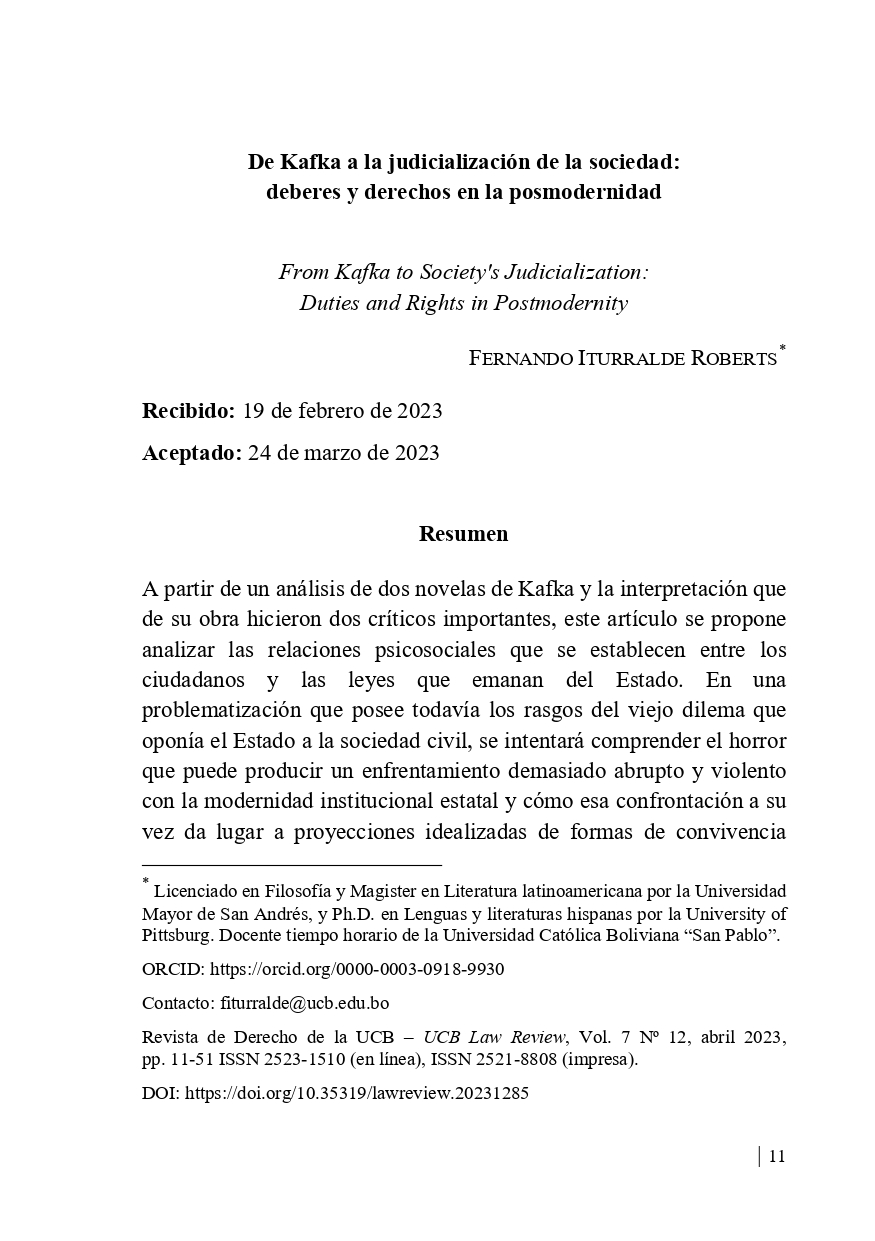From Kafka to Society's Judicialization: Duties and Rights in Postmodernity
DOI:
https://doi.org/10.35319/lawreview.20231285Keywords:
Kafka, judicialization, René Girard, Gilles Deleuze, Félix Guattari, State, sacrifice, mimesisAbstract
From the starting point of analyzing two of Kafka’s novels and the interpretation made of them by important critics, this article analyses the psychosocial relations established between citizens and the laws that emanate from the state. In a problematizing that still possesses the traits of the old dilemma that opposed the state to civil society, we will understand the horror produced by the abrupt and violent facing off with institutional modernity and how this confrontation gives way to idealized projections of ways of coexistence where there are no modern institutionalizations. Finally, we propose some ideas to get out of the deadlock in which the contradiction between individualization and corporative belonging to claim rights with a tendency towards an authoritarian organization puts us in. To achieve these goals, we proceed with three moments of analysis: first, Kafka, his novels, and the vision of a state that remains unattainable with an ambivalent law. Then, we see the individualization effects arguing that, where it fails, the extremes of individual judicialization are also at risk of failing. In the end, we propose ways to avoid the double bind of collectivism and individualism.
Downloads
References
Alison, J. (2001). Faith Beyond Resentment: Fragments Catholic and Gay. New York: The Crossroads Publishing Company.
Bourdin, J.-M. (2023, 31 de enero). Terminus Malaussene, dixit Pennac. L’émissaire: https://emissaire.blog/2023/01/31/terminus-malaussene-dixit-pennac/
Casanova, P. (2008). La Republique mondiale des lettres. Paris: Seuil.
Claros, L. (2022). Lógicas de la identidad y la historia. La Paz, Bolivia: Plural/CIDES-UMSA.
Deleuze, G. (1972). L’AntiOedipe. Paris: Minuit.
Deleuze, G. (1993). Critique et clinique. Paris: Minuit.
Deleuze, G. (septiembre 1995). L’immanence: une vie... . Philosophie (47), 3-7.
Deleuze, G. & Guattari, F. (1978). Kafka. Por una literatura menor. México D.F: Era.
Dumouchel, P. (Spring 1995). “Hobbes and Secularization: Christianity and the Political Problem of Religion”. Contagion: Journal of Violence, Mimesis, and Culture, 2, 39-56.
Dupuy, J.-P. (2013). The Mark of the Sacred. East Lansing, Michigan: Michigan State University Press.
García, A., Tapia, L. & Prada, R. (2007). La transformación pluralista del Estado. La Paz: Muela del diablo.
Girard, R. (1986). El chivo expiatorio. Barcelona: Anagrama.
Girard, R. (1990). Shakespeare. Les feux de l’envie. Paris: Grasset.
Girard, R. (1995). La violencia y lo sagrado. Barcelona: Anagrama.
Girard, R. (2014). When These Things Begin: Conversations with Michel Treguer. East Lansing, MI, USA: Michigan State University Press.
Guillebaud, J.-C. (1998). La tyrannie du plaisir. Paris: Seuil.
Kafka, F. (1976). El castillo. Madrid: Alianza.
Kafka, F. (2013). El proceso. Madrid: Alianza.
Levrero, M. (2008). Ciudad. Barcelona: Debolsillo.
Levrero, M. (2010). El lugar. Barcelona: Debolsillo.
Nayrolles, J. (2019). Du sacrificiel dans l’art. Paris: Kimé.
Nayrolles, J. (2020). Le sacrifice imaginaire: essai sur la religion de l’art chez les Modernes. Paris: Kimé.
Oporto, H. (2018). ¿Cómo somos? Ensayo sobre el carácter nacional de los bolivianos. La Paz: Plural.
Tapia, L. (2011). El Estado de derecho como tiranía. La Paz: CIDES-UMSA.
Tocqueville, A. de. (2012). La democracia en América. México D.F.: FCE.
Tucker, R. C. (Ed.) (1978). The Marx-Engels Reader. New York/London: W. W. Norton & Company.
Žižek, S. (2002). Mirando al sesgo Una introducción a Jacques Lacan a través de la cultura popular. Buenos Aires: Paidós.
Žižek, S. (2015). Menos que nada. Hegel y la sombra del materialismo dialéctico. Madrid: Akal.

Downloads
Published
How to Cite
Issue
Section
License

This work is licensed under a Creative Commons Attribution-NonCommercial-ShareAlike 4.0 International License.
The U.C.B. Law Review is an Open Access Journal, therefore, it is full free for access, reading, search, dowload, distribution and lawfull reuse in any medium only for non-comercial purposes, provided the original work is properly cited.








